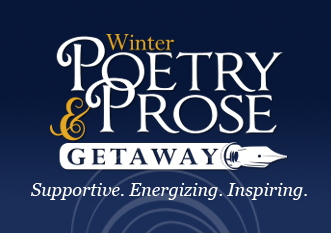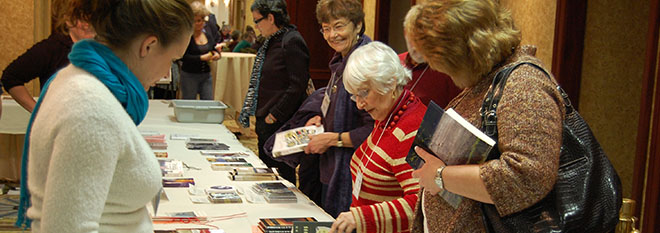The Ripple in Your Day
by Douglas Goetsch
I’d like to pull back the hair from your face
and ask how you get through the ripple in your day,
the one that comes unannounced
like a feral animal sitting on the lawn
facing your windows—you’d think
you’d be used to it by now. It stays
maybe a minute, maybe an hour,
and doesn’t go away until it does.
Do you settle into your favorite chair
with the universal remote, spend an hour
in the shower, bury your head
in crosswords, sleep in your clothes?
Do you buy crap on eBay, Google
people from your old school, picturing
the days they’re having in other cities?
Does coffee deliver you, perhaps
an early cocktail, a spoon and a half-
gallon of cookie dough ice cream?
Maybe you scream at Customer Service,
or research how to make a bomb.
Painkillers would be refreshingly direct.
Are you one of those who can stare at themselves
in the mirror and pronounce affirmations?
Do you pray, or do you put on
a certain song and sway empty-
handed in the darkening room?
What is it that you do, do every day,
that everybody does, even heroes on posters
we hung in our childhood bedrooms—
athletes, rock stars, Hollywood A-listers
who, if they don’t make it past the ripple
in their day, end up in the papers,
drunk in their driveways, wandering nameless
in Orange County, found motionless
on their made beds or in their bathrooms.
Cloistered nuns, Henry Kissinger, people
in the People’s Republic of China—
everybody’s day, even their best day,
has a ripple, when something reverses,
dust motes float slowly upward
and memories of old wounds
trudge into the room like wet dogs.
Have you come to believe the ripple is you?
The ripple isn’t you. How you
get through it—that’s not even you,
it’s just your life, your story, the story
of us all, each inside our own day,
and with you, though feeling so separate
and holding on. Holding on.
Douglas Goetsch joined poet Shoshauna Shy for a conversation about his poem “The Ripple in Your Day,” an edited version of which follows below. Both the interview, in full, and the poem were originally published in Verse Wisconsin.
I’ve been a writer of poetry for about 25 years. I got the bug as a young public school teacher in New York, while teaching a unit in poetry to 9th graders. Lately I’ve been questioning with more and more rigor how much a poem I’m writing could interest, to use a phrase of Gaston Bachelard’s, minds “foreign to its creation.” I look at my early poems as being of little relevance to anyone besides me and those seeing themselves as like-minded. At the same time poetry is less and less about “self-expression” for me; the poems themselves seem to be coming from deeper, more individuated places.
“The Ripple in Your Day” was triggered directly by Hollywood—something rare for me. Heath Ledger had just killed himself with drugs, and Owen Wilson, after a suicide attempt, was making a new comedy. Other than the fact that they are people who have what so many in our society want—fame, money, etc.—I knew little about them, though I was overcome at the time with a theory: their disasters stemmed from a small moment, a ripple, that happens to all of us. A difficult interlude shows up on our doorstep, daily, and how we navigate that ripple says more about us than just about anything. Some professional person might say there’s a history or pattern to such trouble (the tabloids prefer “demons”), but even so, there’s always a first moment, when the “demon” is just a strange animal on the lawn that might not even mean us any harm.
I think the deeper puzzle, [though,] is how a celebrity doesn’t self-destruct, residing as celebrities do in the black hole of our nation’s psychosis. Add to that the number of people with serious identity disorders who self-select for the acting profession, and you have Kelsey Grammer—everyone’s favorite TV therapist—found drunk in his flipped over car near his home. The “wandering around nameless in Orange County” could be Anne Heche or Margot Kidder; “found motionless on their made beds or in their bathrooms” could be Elvis or Marilyn or hundreds of others… Michael Jackson, Whitney Houston… I hope not Lindsay Lohan, though it doesn’t look good. But that’s not to say we all don’t have our disasters—which is what the poem is even more about.
What makes me fond of “The Ripple in Your Day” is that it’s somewhat of a singleton for me: a poem that advances a philosophical or psychological theory, but it also has the properties of a sermon; it’s also a catalogue poem, which is how it gets down the page. It’s a fairly public poem—some examples ripped, as they say, from the tabloid headlines—yet it felt strangely personal to write. When I do a reading, it’s the piece that sends the audience into their own lives the most. Once in Oklahoma, when I got to the part about memories of old wounds trudging into the room like wet dogs, a woman in the back let out this exhausted moan. It was more eloquent than anything in the poem.
© Douglas Goetsch. Originally Published in Verse Wisconsin, Issue 109, July 2012.
+ + + + + + + + + +
Douglas Goetsch is the author of three books of poems and four prizewinning chapbooks. His work has appeared in The New Yorker, The Gettysburg Review, Poetry, The Southern Review, and Best American Poetry. Among his honors are fellowships from the National Endowment for the Arts and the New York Foundation for the Arts, and a Pushcart Prize. He has been on faculty at dozens of conferences and programs throughout the U.S., including the Iowa Summer Writing Festival, and is the 2012 Distinguished Visiting Professor of Creative Writing at Western Kentucky University. Previously he was a New York City public school teacher for 21 years. Goetsch is also the founding editor of Jane Street Press in New York City. Read more of Doug’s work on his website.
+ + + + + + + + + +
Want to study with Douglas Goetsch? At the 2013 Winter Poetry & Prose Getaway, Doug will be leading the Free-Writing Intensive Workshop. Click here to find out more.
+ + + + + + + + + +
Advance your craft and energize your writing at the Winter Poetry & Prose Getaway. Enjoy challenging and supportive sessions, insightful feedback, and an encouraging community. Learn more.




